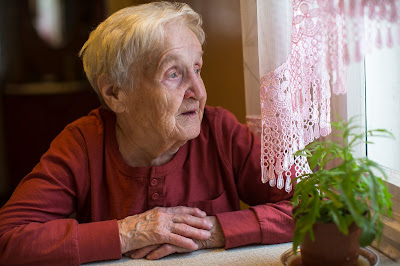 |
| Lonely Senior Thinking |
In this new era of technology, with just a few clicks of text, you can stay connected with individuals from all over the world. But, even with the latest advancements in technology, there are many seniors today who live in isolation and deal with loneliness.
Surprisingly, loneliness not only affects someone mentally but also adversely affects the physical health of an individual. As friends, family members or caregivers, it is essential to be aware of the effects that loneliness can have on a senior’s mental and physical health.
How Lonely Are Seniors Today?
There has been ample research done on the topic of loneliness among the senior community. Less than 20% of seniors live alone and a recent study from the University of California in San Francisco suggests that living with others may feel lonely. 43% of seniors surveyed and the results were quite shocking as the seniors felt lonely even when they were not living alone.
Seniors that are 60 years of age and older who report feelings of loneliness had a 45% higher risk of death as compared to those who do not report feeling lonely. Isolated seniors have a 60% higher risk of mental and physical decline than those who do not experience social isolation.
Why Is Loneliness A Serious Concern?
As per the research, it is found that when a feeling of loneliness creeps in, it can increase the risk of anxiety, alcohol abuse, overeating, malnutrition, depression, mental and other social health issues. Loneliness can even increase the chance of high blood pressure, heart disease, arthritis and even glaucoma.
Many seniors do not live an active lifestyle and spend most of their time indoors. This further increases the likelihood of developing serious health issues that keep senior adults more confined. No matter how common this issue is in the senior community; it does not mean that friends, family and loved ones cannot do anything to lessen the impact of loneliness.
How to Protect Your Senior Loved One from the Loneliness?
One of the first things to remember that physical isolation is one of the biggest contributing factors to feelings of loneliness. Even if your loved one is not socially engaging with others, however being in a location where they see other individuals around on a regular basis can actually lessen their feelings of loneliness. Transportation challenges also impact a senior’s feelings of isolation which means there are many seniors living without an access to transportation. Helping seniors cope with a loss of independence can go a long way in warding off feelings of isolation.
On the other hand, new activities like clubs, gyms or volunteering are all great ways for seniors to challenge them to try something different and this would help them to maintain an active social life. This prevents loneliness and depression before it even starts.
Moreover, senior living facilities can also make the dramatic difference in any senior’s social life and combat feelings of loneliness magnificently. However, there are many other ways that loved ones can be more proactive in helping seniors get the social interactions they need to keep themselves mentally fit.
Comments
Post a Comment